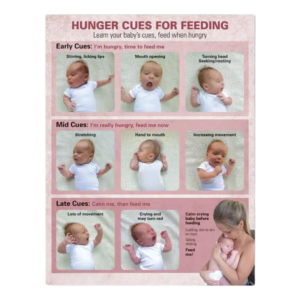How Do I Know If My Baby is Hungry?
Babies should be fed when they indicate hunger. Crying is a late indicator of hunger. Breastfeeding can be much easier for both mom and baby if mom is able to pick up on baby’s earlier hunger cues.
Feeding Cues
- Licking lips, smacking/sucking sounds, opening mouth, sticking tongue out

- Sucking on anything nearby
- Rooting
- Hand to mouth
- Fidgeting, squirming, breathing fast, positioning for nursing
- Fussing
- Frantic, agitated movements
- Crying, turning red
Common Infant Hunger Cues Include:
Early
- Smacking or licking lips
- Opening and closing mouth
- Sucking on lips, tongue, hands, fingers, toes, toys, or clothing
Active
- Rooting around on the chest of whoever is carrying them
- Trying to position for nursing, either by lying back or pulling on your clothes
- Fidgeting or squirming around a lot
- Hitting you on the arm or chest repeatedly
- Fussing or breathing fast
Late (calm baby before feeding)
- Moving head frantically from side to side
- Crying
Your newborn wants to sleep all the time! Should I wake him to nurse?
If he doesn’t wake on his own, yes. Many newborns are very sleepy in the early days or weeks and may not exhibit hunger cues as often as they actually need to eat. Newborns should be nursed anytime they cue hunger, but at least every 2 hours during the day and at least once during the night. Once your baby has the established a good weight gain pattern (at least 4 ounces per week, for babies under 4 established a good weight gain pattern (at least 4 ounces per week, for babies under 4 months), you can stop waking baby to nurse and let him set his own pattern.
Your Baby Just Started Sleeping Longer at Night – Do I Need to Wake Them to Nurse?
If your baby is younger than 4 weeks, then it is a good idea to wake baby at least every 4 – 5 hours at night to nurse if they do not wake on his own. If your child is older than 4 weeks, you can allow baby to sleep as long as they want at night as long as they are peeing, pooping and gaining weight within normal parameters.
My Baby Frequently Sucks on Their Hands – Does This Always Mean That They are Hungry?
After the newborn period, hand sucking is not as reliable an indicator of hunger. Starting at around 6 – 8 weeks, baby will begin to gain more control over their hands and will soon begin to explore their hands and everything else using their mouth. It is also common for babies to suck on their hands when their gums become tender in preparation for tooth eruption. Symptoms of teething can sometimes occur weeks and even months before their first tooth erupts.
For help and more resources for pregnancy, birth and postpartum needs, look here. I’m here to help with any questions or concerns.




